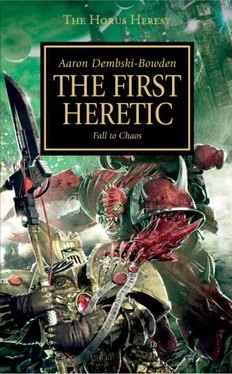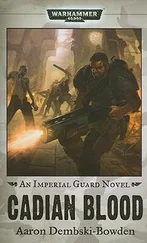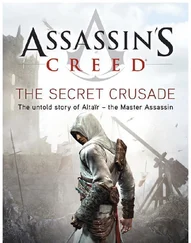Aaron Dembski-Bowden - The First Heretic
Здесь есть возможность читать онлайн «Aaron Dembski-Bowden - The First Heretic» весь текст электронной книги совершенно бесплатно (целиком полную версию без сокращений). В некоторых случаях можно слушать аудио, скачать через торрент в формате fb2 и присутствует краткое содержание. Жанр: Боевая фантастика, на английском языке. Описание произведения, (предисловие) а так же отзывы посетителей доступны на портале библиотеки ЛибКат.
- Название:The First Heretic
- Автор:
- Жанр:
- Год:неизвестен
- ISBN:нет данных
- Рейтинг книги:3 / 5. Голосов: 1
-
Избранное:Добавить в избранное
- Отзывы:
-
Ваша оценка:
- 60
- 1
- 2
- 3
- 4
- 5
The First Heretic: краткое содержание, описание и аннотация
Предлагаем к чтению аннотацию, описание, краткое содержание или предисловие (зависит от того, что написал сам автор книги «The First Heretic»). Если вы не нашли необходимую информацию о книге — напишите в комментариях, мы постараемся отыскать её.
The First Heretic — читать онлайн бесплатно полную книгу (весь текст) целиком
Ниже представлен текст книги, разбитый по страницам. Система сохранения места последней прочитанной страницы, позволяет с удобством читать онлайн бесплатно книгу «The First Heretic», без необходимости каждый раз заново искать на чём Вы остановились. Поставьте закладку, и сможете в любой момент перейти на страницу, на которой закончили чтение.
Интервал:
Закладка:
‘He just left?’ Cyrene asked. Her nose wrinkled, either in confusion or distaste, Argel Tal wasn’t sure which.
‘He had no choice,’ the captain replied.
‘And then what happened?’
‘And then... the primarch looked out over the Legion. He watched us for what felt like an age. And at last, just before speaking, he smiled.’
‘What did he speak of?’
‘Two things.’ Argel Tal looked away from her. ‘Firstly, an ancient belief called the Pilgrimage, to seek a place where gods and mortals meet. And then, he spoke of Colchis.’
‘Your home world?’ there was wonder in her voice. Colchis. The cradle of angels.
‘Yes,’ Argel Tal replied, seeing the reverence in her features. ‘We’re going home.’
NINE
Crimson King
The City of Grey Flowers
Blessed Lady
Colchis is a thirsty world.
Depending on the speaker, those words were voiced with a smile or a curse. But they remained true: the continents were raw with thirst, and the world itself was marked by memories.
At three times the size of Terra, with a fraction of the population, it took almost five standard years to turn once around its merciless sun. And it turned with great patience: a day lasting a Terran week, a week lasting a Terran month.
From orbit, its skin was a visage of unforgiving mountain ranges and auburn desert plains, veined by threading rivers. It was in dry lands like these that that humanity’s ancestors – the very first men and women on the world no longer called Earth – rose in lands that would become known as the cradle of civilisation.
Colchis was aboriginal in the same way. Mankind had been born in lands kin to those blanketing its surface, making Colchis an Earth that might have been, rather than the Terra that was.
Over the generations, civilisation had spread itself thin across the arid continents, with most cities clinging to the coasts. Each city-state maintained links to the others though sky trade and ocean freight, on a world where roads across the desert plains would be little more than folly.
Unlike much of the emergent Imperium, Colchis was unprotected by vast orbital weapon platforms. More tellingly, it also had little in the way of the industrious space stations responsible for feeding and refuelling parasitic expeditionary fleets in their crusades through the galaxy.
Colchis still bore scars of long-forgotten greatness – an age of wonders, ended in fire. In that sense, it was a future echo of what Khur had so recently become. The world’s surface was bruised dark by the bones of dead cities, fallen in unrecorded ages, never resettled. New cities rose elsewhere with the genesis of a simpler, quieter culture. The ancient ruins suggested a machine-driven empire once ruled Colchis, though little evidence ever came to light regarding its destruction. The lost kingdom’s legacy was evident even in orbit, where drifting, dead hulks – locked in orbits that would still take millennia to completely decay – marked the graves of interstellar shipyards.
Few Imperial fleets ventured near Colchis, and not merely because of its lack of resupply capacity. Rumours circulated, citing unreliable shipping lanes, and the disappearance of the 2,188th Expeditionary Fleet in a nearby region, added fuel to that particular fire. Colchis seemed a world focused upon looking inwards, even backwards, refusing to clear its skies of wreckage from the Dark Age of Technology, and resisting all Imperial edicts to establish new orbital bases. The planet’s one concession was to allow the Mechanicum of Mars access to those serene hulks, letting the tech-priests plunder whatever they desired.
And they’d done just that, with great enthusiasm, for great profit.
The region was not haunted. No Imperial commander would ever give voice to a laughable superstition, when such words were holdovers from a more indecorous age. Yet still Colchis saw scarce traffic, and its resistance to supplying the Great Crusade remained inviolate.
It was said this defiance could only have come from Lorgar, the Emperor’s Seventeenth Son, for no other authority would allow a planet to remain so curiously provincial. In the capital city, Vharadesh, a golden plaque was fixed to the immense doors leading into the Spire Temple of the Covenant. This tablet marked the primarch’s supposed words – words he’d never admitted, yet never denied, speaking to his father.
‘Take me from my home, and I will sail to the stars of your empire. I will serve as a son must serve. But let Colchis stand as I have shaped it: a planet of peace and prosperity.’
It was also said, by the few that witnessed such rare moments, that the primarch smiled each time he passed those words, and reached out to stroke his golden fingertips across the etched lettering.
Colchis was hardly devoid of technology. It enjoyed the benefits of Imperial life and culture, despite its master’s hesitance to supply materiel for the Emperor’s war. Auspices in the sky-traffic towers of Vharadesh tracked the activity in orbit, with scanner consoles lighting up at the sudden pulse of so many signals.
It had been many years since the Urizen returned home.
This time, there was someone waiting for him.
The ship bore a proud title, named in honour of a legendary city in the murky tides of Prospero’s complicated mythology. The Sekhemra was the only live vessel in the heavens above Colchis, and it rested in its geocentric orbit, weapons unpowered, shields inactive. The humble strike cruiser seemed content to wait in silence, bathing its red hull in the fierce illumination offered by the system’s sun.
Reality opened in an uneven rent, and the Word Bearers fleet streaked across the void, great engines also streaming light into the darkness as they powered towards their home world.
On the strategium of the Fidelitas Lex, the Lord of the Legion watched the red ship’s resolving image on the occulus. He smiled, and closed his eyes as emotion threatened to overtake him.
‘Incoming hail,’ a bridge officer called.
‘Open channel,’ Lorgar replied. The smile didn’t leave his face when he opened his eyes, and the occulus projected a grainy image from the opposing vessel’s command deck.
The pict revealed a giant in unprepossessing black-stained mail armour, surrounded by his own bridge crew. His skin had a dark, coppery hue, as if he spent many long days under alien suns, and his helm bore a scarlet plume of cresting hair. One eye was sealed, puckered shut from an old wound. The other glinted with a colour that couldn’t be made out through the image’s distortion.
‘A trifle melodramatic, brother,’ said the giant in an amused baritone. ‘That many ships, when I only brought one.’
‘You came,’ Lorgar said through his smile.
‘Of course I came. But you owe me some answers, dragging me across half the Imperium like this.’
‘You’ll have them, I promise you. It lifts my heart to see you.’
‘And mine, to see you. It has been too long. But... brother,’ the giant hesitated. ‘There was talk of Monarchia. Is it true?’
The smile faded. ‘Not now,’ Lorgar said. ‘Not here.’
‘Very well,’ said Magnus the Red. ‘I’ll meet you in the City of Grey Flowers.’
Life always struggles in the desert.
On Colchis, as on many of the Imperium’s dryest worlds, the indigenous life coped with the climate however it could. For the human population, it was a matter of coastal cities, immense water filtration facilities, irrigation farming, and dealing with the seasonal floods from the rushing rivers that acted as blood vessels for the arid plains.
Vharadesh, the Holy City, was the nexus of such industrious efforts. Swathes of irrigated farmland reached out from the city walls, a triumph of ingenuity over nature. Colchis was a thirsty world, but the perfection of the human form showed in all things.
Читать дальшеИнтервал:
Закладка:
Похожие книги на «The First Heretic»
Представляем Вашему вниманию похожие книги на «The First Heretic» списком для выбора. Мы отобрали схожую по названию и смыслу литературу в надежде предоставить читателям больше вариантов отыскать новые, интересные, ещё непрочитанные произведения.
Обсуждение, отзывы о книге «The First Heretic» и просто собственные мнения читателей. Оставьте ваши комментарии, напишите, что Вы думаете о произведении, его смысле или главных героях. Укажите что конкретно понравилось, а что нет, и почему Вы так считаете.












